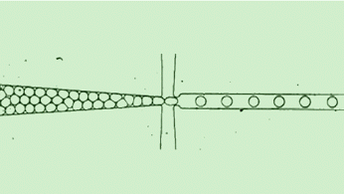[Wikidata] Data amplitude and representation
Hi,
I am investigating some concepts about signal processing and relating them to data manipulation. It is somehow difficult because the way computer scientists relate to concepts is very dogmatic, something is either black or white, however I have not found much on "things that under certain circumstances can be considered black-ish, and under another set of circumstances can be considered white-ish"
http://freethoughtblogs.com/singham/2012/06/25/shades-of-grey-optical-illusion/
In signal processing there is the concept of amplitude which is just the signal strength. For humans language is like an amplitude communication process where the receiver picks up not only the signal, but also its amplitude depending on context, awareness, previous knowledge, etc. factors which in turn can be considered waves being processed by the ontological biological-organizational complex, the body-mind.
It is tough to describe that a certain concept might have a certain amplitude in some situations and other amplitude in other situations, and perhaps even harder to make a human interface for it.
Has anyone attempted it in the past? If Q items are not static entities, what is the best way to convey that they are not? And is it possible or desirable at all?
Perhaps these questions are more suitable for a Wikidata 2.0, or perhaps it is already doable, who knows.
Any thoughts?
Cheers,
Micru
_______________________________________________
Wikidata mailing list
Wikidata@lists.wikimedia.org
https://lists.wikimedia.org/mailman/listinfo/wikidata
Hi Micru and Wikidatans,
Anthropology actively develops participant observation as methodology in academic spheres in multiple languages, and it also centralizes writing about peoples and field sites and related anthropological questions in a globalizing world these days. I wonder how one best could add fairly open participant observation field note "data fields" as notation to Q items in Wikidata ... as one sensible approach to the questions you're asking, anticipating versions after Wikidata 2 as well.
Apply the wiki Wikipedia approach to Wikidata Q items?
While one could further focus such a wiki / writing / Q item approach in terms of amplitude, and a host of other physics' concepts, coding Wikidata database Q items for writing-openness in specific ways in terms of developing data manipulation has merit.
Scott
*
See, too, for example:
Wikidata_databases_and_ecosystems -
http://worlduniversity.wikia.com/wiki/Wikidata_databases_and_ecosystems
Wikidata_databases_and_ecosystems#World_University_and_School_Links -
http://worlduniversity.wikia.com/wiki/Wikidata_databases_and_ecosystems#World_University_and_School_Links
Science -
http://worlduniversity.wikia.com/wiki/Science
*
And some further replies in this email thread:
Hi Micru,
On Sun, May 31, 2015 at 2:56 PM, David Cuenca Tudela <dacuetu@gmail.com> wrote:
If you can describe the value of the concept you are referring to with a mathematical function, it is enough if Wikidata contains the fundamental/basic data values that can be used in the function to compute the value of the concept in a certain situation. I don't think Wikidata needs to contain all the possible outputs of that function. For example, if the data about the boiling point of water at sea-level is available in Wikidata, one can use that to compute the boiling point of water at other pressures by using a formula.
Has anyone attempted it in the past? If Q items are not static entities, what is the best way to convey that they are not? And is it possible or desirable at all?It is tough to describe that a certain concept might have a certain amplitude in some situations and other amplitude in other situations, and perhaps even harder to make a human interface for it.
If you can describe the value of the concept you are referring to with a mathematical function, it is enough if Wikidata contains the fundamental/basic data values that can be used in the function to compute the value of the concept in a certain situation. I don't think Wikidata needs to contain all the possible outputs of that function. For example, if the data about the boiling point of water at sea-level is available in Wikidata, one can use that to compute the boiling point of water at other pressures by using a formula.
Perhaps these questions are more suitable for a Wikidata 2.0, or perhaps it is already doable, who knows.
Please correct me if I'm wrong: it seems to be tne case that these questions are more about the interfaces and technologies built on top of Wikidata, not so much about Wikidata itself (except for the point that the fundamental data should exist in Wikidata).
Best,
Leila
*
Hi Leila
On Mon, Jun 1, 2015 at 9:32 AM, Leila Zia <leila@wikimedia.org> wrote:
Please correct me if I'm wrong: it seems to be tne case that these questions are more about the interfaces and technologies built on top of Wikidata, not so much about Wikidata itself (except for the point that the fundamental data should exist in Wikidata).
Yes, in a way it is more about representation that anything else, but it also has to do with the conceptual framework. In the current organization it is assumed that I want to know about an specific Q item, whereas in my thinking about signals I would prefer to have an overview of all items that are related to a keyword.
For instance if I enter Chopin, either I have to select one item from a list or I have to perform a search, there is no middle way of displaying an overview of all items grouped by the kind of relationship that they might have to the keyword chopin. In a way it is a bit like creating a disambiguation page on the fly, with the added difficulty of grouping elements that belong together. For instance if I search Bach, it would make sense to group people with the string "bach" related to the same family together, and divide it by topic, like a sort of disambiguation page for data:
https://en.wikipedia.org/wiki/
https://en.wikipedia.org/wiki/
What is difficult is to find an automatic arrangement that works for most situations, or explore a different way of creating data disambiguation pages, perhaps based on current disambiguation items. Is there any way to make this item more useful with some visualization of items it disambiguates?
https://www.wikidata.org/wiki/
https://www.wikidata.org/wiki/
Cheers,
Micru
*
I second Leila, it sounds like what you’re referring to (disambiguation, grouping related items) should be addressed by the backend / search API and exposed by the UI, and not solved by explicitly (as in, manually) representing and storing these relations in wikidata.
Dario
*
If I understand you correctly, your are looking for a way to describe different
meanings or facettes of a *word*, building clusters based on what other concept
each of these meanings is related to.
Since Wikidata does not (yet) deal with words at all, we can only defer this
until we do (see the Wikidata/Wiktionary proposal). But others have done this:
have a look at the "Wortschatz" project by the University of Leipzig:
http://corpora2.informatik.
The graph at the bottom shows clusters of collocations for each meaning/facette.
It's a bit hard to find good examples though, usually one meaning is very dominant.
Daniel Kinzler
Daniel Kinzler
Senior Software Developer
Wikimedia Deutschland
Gesellschaft zur Förderung Freien Wissens e.V.
*
Daniel, thanks for your example, it looks very good!
Micru
*
...




 WorldUnivandSch
WorldUnivandSch








